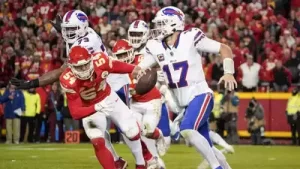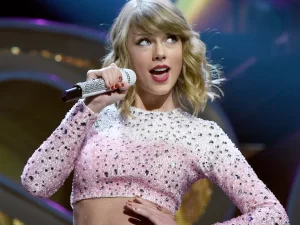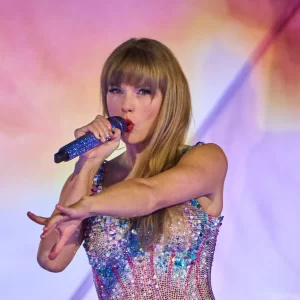
Taylor Swift’s Song, “Don’t Blame Me”
A Meditation On the Nature of Blame
by Jeffrey Rubin, PhD
Welcome to From Insults to Respect.
 In a few days, Super Bowl Sunday will arrive. Sadly for me, my Buffalo Bills won’t be playing. I’m not blaming them, though.
In a few days, Super Bowl Sunday will arrive. Sadly for me, my Buffalo Bills won’t be playing. I’m not blaming them, though.
Most of us assign blame based on adding together degree of intentionality and harm. Said another way, Blame = Intent + Harm. To me, the Bills did not intend to lose the crucial game against the Kansas City Chiefs. Additionally, the harm to me because of that loss consisted of a few days of disappointment. At this point, I’ve pretty much fully recovered.
 Some people will blame a person, a group of persons, or even themselves for extensive periods of time. Their blame can lead to disrespecting the blamed person or persons to such an extent that they spend a great deal of time throwing insults at the blamed person, and it ends up diminishing the blamers’ quality of life. Therefore, we might want to consider whether we would be wise to transform some of our blaming to a more peaceful understanding.
Some people will blame a person, a group of persons, or even themselves for extensive periods of time. Their blame can lead to disrespecting the blamed person or persons to such an extent that they spend a great deal of time throwing insults at the blamed person, and it ends up diminishing the blamers’ quality of life. Therefore, we might want to consider whether we would be wise to transform some of our blaming to a more peaceful understanding.
 As I thought about writing a post about this, word came to me that talented superstar Taylor Swift will be attending the Super Bowl. Then it occurred to me that one of her popular songs is “Don’t Blame Me.” Perhaps a little meditation on the song’s lyrics might be a fun and useful way to explore this issue. So, I invite you to join me in giving this a try.
As I thought about writing a post about this, word came to me that talented superstar Taylor Swift will be attending the Super Bowl. Then it occurred to me that one of her popular songs is “Don’t Blame Me.” Perhaps a little meditation on the song’s lyrics might be a fun and useful way to explore this issue. So, I invite you to join me in giving this a try.
Meditating On the Lyrics of “Don’t Blame Me”
The first few lines, sung with passion, are:
In the darkest little paradiseShakin, pacin’, I just need youFor you, I would cross the lineI would waste my timeI would lose my mindThey say, “She’s gone too far this time”
My name is whatever you decideAnd I’m just gonna call you mineI’m insane, but I’m your baby (your baby)Echoes (echoes) of your name inside my mindHalo, hiding my obsessionI once was poison ivy, but now I’m your daisy
And baby, for you, I (I) would (would) fall from graceJust (just) to (to) touch your faceIf (if) you (you) walk awayI’d beg you on my knees to stay
In my view, when people go through such experiences, if the blaming amounts to a bunch of name calling, and beating oneself up in other ways, than that’s going to make such challenging experiences worse. During such times, people might be calling you names, and you may be calling yourself names, especially if some degree of intention is perceived.
In our society, this is a common experience when what you are doing is hurting others and yourself. Perhaps it is wise to accept that the insults are based on old habits, but not helpful. Perhaps by accepting blame, in the sense of accepting responsibility, would be better. What I mean by this is that we fully observe the internal physical sensations that go with the recognition of the hurt, fully experience this during periods of meditation, along with a sense of confidence that these feelings will spur a search process for creating a better path forward. The search may not immediately produce the results you might wish for, but such challenging experiences through patience and self compassion, might be a more fulfilling path than one that takes to heart the various insults getting thrown around.
Jeff
Some people will enjoy reading this blog by beginning with the first post and then moving forward to the next more recent one; then to the next one; and so on. This permits readers to catch up on some ideas that were presented earlier and to move through all of the ideas in a systematic fashion to develop their emotional intelligence. To begin at the very first post you can click HERE.






This whole ‘blame’ thingy is largely based on Abrahamic religions. To me it’s nonsense and doesn’t have much influence on me. Anyone can blame me for anything that pops up into their head. But it won’t affect me*. Given my personality, though, and if in the mood for it, in the end it probably would only affect them.
The lyrics of your Tayler Swift song make me think she’s babbling about what I call mainstream love. And that’s not love that appeals to me. The time I still did some marriage counseling, that kind of love bored the hell out of me. Btw, ever heard of twin-flames? More my kind of love.
* Of course, it is a different story if I have made a mistake that has harmed someone.
Hi Roald,
Great to hear from you, it’s been too long..
You ask if I heard of “twin-flames” which is more your kind of love than what Swift referred to in her song.. No, I hadn’t, but your question led me to ask Google what it is. It retrieved a Forbes article that described it in the following way:
A twin flame relationship is thought to be a spiritual or soulful connection in which two people are equally matched in their “commitment to themselves, to the relationship and to each other,” explains Angela Amias, licensed clinical social worker and clinical director of the Institute for Trauma Informed Relationships based in Cheyenne, Wyoming.
“Individuals who are twin flames are thought to push and challenge each other towards self-discovery and personal growth, says Avigail Lev, Psy.D., a San Francisco-based licensed clinical psychologist and founder and director at Bay Area CBT Center.
“[Twin flame] relationships begin with a spark of such intensity that [may] initially feel overwhelming to one or both people,” says Amias. “[These] relationships quickly deepen and it often feels like you’ve known each other forever.”
Thanks for introducing me to a new term. As for your stated lack of interest in the blame thing unless you made a mistake that led to harm, I hope my post on Swift’s song didn’t bore you too much.
Warm Regards,
Jeff